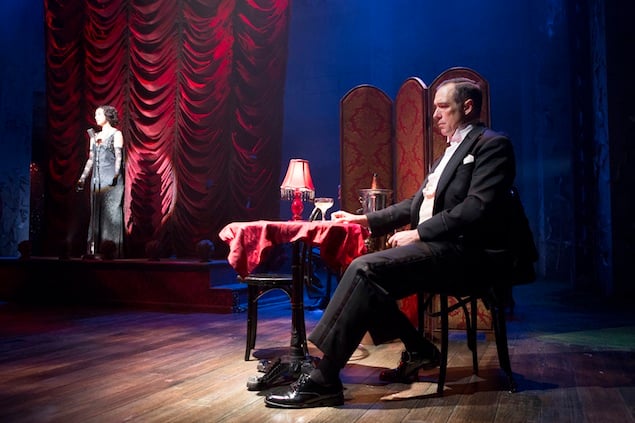
It’s a tale of hypocrisy as old as humanity itself: A family-values hardliner gets
caught soliciting sex in the most un-Christian way imaginable and begs publicly for
forgiveness. In Shakespeare’s
Measure for Measure, he’s initially sentenced to death
as a result before his wife entreats for mercy.
In modern Washington, he continues to serve in the
Senate,
in the
House,
as a host on
Fox News,
on the Supreme
Court,
and even as a candidate for
President.
Our culture, one might argue, is now so accustomed to sex scandals that they’re no
longer the death knell to political ambitions or public life in the way they once
were. But there’s a potency to
Measure for Measure, and a sharply modern edge, that makes it one of Shakespeare’s most timeless works.
Jonathan Munby’s production, currently playing at Shakespeare Theatre, amps up the sex in a way
that feels distinctly old-fashioned, giving it the deceptively harmless air of Victorian
pornography or Restoration-era bawdy plays instead of acknowledging it as the ultimate
expression of both power and intimacy.
The show begins 20 minutes before it actually starts with a
Cabaret-style sequence of German songs and smutty dances in a 1930s Vienna club being performed
onstage as the audience take their seats. What’s presumably intended to shock—nipple
tassels and men in corsets—isn’t a mite as powerful as what transpires later in the
play, although the original songs by
Adam Wernick are engaging enough. Instead, it’s an odd opening sequence that doesn’t add much
meaning to the rest of the play beyond emphasizing what a den of licentiousness and
sink of iniquity Vienna has become.
In mourning the city’s decline, the Duke (Kurt Rhoads) appoints sniveling toady Angelo (Scott Parkinson) as his deputy while he takes a
leave of absence, disguising himself as a priest
to observe the subsequent action. Angelo, a Ken Cuccinelli
killjoy
of the highest degree, subsequently sentences a young man,
Claudio (Avery Clark), to death for impregnating a young woman (Katie deBuys) whom he intends to marry. Claudio’s sister, Isabella (Miriam Silverman), a novice nun, begs Angelo to spare her brother’s life; he, in a fit of lust, declares
he will only do so if she gives him her virginity.
The design elements in the show are fantastically ominous, drawing heavily on the
fascism looming over Western Europe in the 1930s, and with vast red and black flags
evoking the Norsefire party in
V for Vendetta. As locations transform from churches to prisons to nightclubs, actors pull moving
scenery on and offstage to a clanking soundtrack that emphasizes the urgency of Claudio’s
situation (the sets are by
Alexander Dodge). While the costumes are for the most part unobtrusive, designer
Linda Cho has fun with the cabaret scene, outfitting strippers in removable nun costumes and
men in lederhosen that’s minimalist, to say the least.
Still, the show draws most of its strength from flawless performances, particularly
by Parkinson as the inappropriately named Angelo. A volte-face such as his can either
explain itself through rank hypocrisy or temporary insanity, and Parkinson seems to
opt for the latter, portraying his Angelo as falling under the influence of feverish
dreams about the chaste Isabella. He repeatedly grabs his crotch then shakes his hand
away with disgust, and in one scene is downright terrifying as he tries to force himself
on a screaming Isabella.
The most rational character in the show is ultimately Rhoads’s Duke, a dignified and
stately figure who sees the shades of gray between Angelo and Isabella’s dogmatic
worldviews. Rhoads is stellar in the role, acting as a calm voice of reason (at least
until the final scene). As Isabella, Silverman is positively steely, demanding earnestly
that Angelo spare her brother’s life and pleading for her revenge when she’s led to
believe he’s been executed.
A terrific supporting cast includes
Naomi Jacobson as Mistress Overdone,
Chris Genebach as Pompey, deBuys as Juliet, Claudio’s pregnant lover, and
Natascia Diaz as Mariana, a pill-popping torch singer inexplicably besotted with Angelo. Elbow (Hugh Nees), is one of Shakespeare’s more tiresome Mr. Malapropists, and the constant interjections
of Lucio (Cameron Folmar) in the final act also start to wear, but both actors serve as effective comic relief.
Still, some scenes could benefit from a little pruning, particularly inside the prison
gates.
Nothing against period productions, but it’s hard not to wonder what insight could
be gleaned from a
Measure for Measure that tackles contemporary attitudes to sex—by all accounts, as fractured, unrealistic,
and extreme as they ever were. A smutty nightclub theme with prostitutes and strippers
feels like a cheap attempt to cash in on the currency of sexuality without tackling
the thorny problem of why it continues to divide us. Like the posters showing a nun
pulling her habit against her groin, the opening cabaret interlude doesn’t seem to
have all that much to do with the rest of the show—which itself has a great deal to
offer.
Measure for Measure
is at Shakespeare Theatre through October 27. Running time is two hours and 45 minutes,
including one intermission. Tickets ($40 to $110) are available via Shakespeare Theatre’s
website.


















